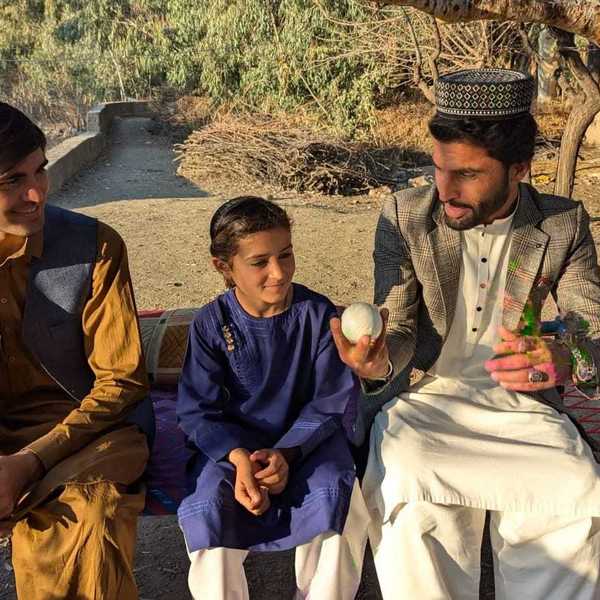Pakistan aim to plug gaps against depleted South Africa in T20I series
For the hosts, this series is less about the immediate result and more about refinement

Zaid Hassan
Producer
Zaid Hassan, a seasoned sports journalist, led Cricket Pakistan as editor for four years, shaping its coverage with insightful analysis. Now a producer at Nukta, he expands into broader storytelling while remaining a key voice in Pakistan’s sports media.

South Africa captain Donovan Ferreira (L) and Pakistan skipper Salman Ali Agha pose with T20I series trophy in Islamabad on Sunday.
PCB
Pakistan will look to iron out their final combinations ahead of next year’s T20 World Cup as they take on a depleted South African side in a three-match series beginning in Rawalpindi on Tuesday, with the remaining two matches scheduled for Friday and Saturday in Lahore.
It has been a mixed year for Pakistan in T20 cricket, with flashes of brilliance punctuated by inconsistency. Under the guidance of white-ball coach Mike Hesson, Pakistan have played 21 matches, winning 14, including a dominant 3-0 sweep over Bangladesh at home and a tri-series triumph in Sharjah against Afghanistan and UAE. Yet, their inability to cross the final hurdle in major tournaments continues to linger, most recently seen in the Asia Cup, where they fell short against arch-rivals India three times, including a heartbreaker in the final.
Selection shifts: Babar returns, Fakhar steps aside
Pakistan’s squad for this series reflects both experimentation and recalibration. Four players from the Asia Cup final, Fakhar Zaman, Mohammad Haris, Hussain Talat, and Haris Rauf, have been omitted. In their place, Pakistan have brought back familiar faces, including Babar, who returns to the T20 setup for the first time in over a year.
Hesson endorsed the decision to recall Babar, explaining that Fakhar himself requested time away from T20s to focus on improving his technique through first-class cricket.
“I certainly endorse his [Babar] selection, with Fakhar Zaman sent to first-class cricket. We’ve had a conversation with him, and he wants to come back into the One-Day scenes, so we’ve given him a bit of a break from T20Is to get his technique back to where he wants to be, and I’ve been really supportive of that,” said Hesson during a media interaction at the Rawalpindi Cricket Stadium on Sunday.
“And that created an opportunity for another top-order player, and it is a great opportunity to get Babar back into the squad. He’s likely to bat at three, so it’s a role that I’m very confident he’ll be able to do well in,” he added.
With Babar’s return, Pakistan is set to open with Saim Ayub and Sahibzada Farhan, while Babar anchors the top order. The middle order, however, remains a work in progress, a theme that has persisted throughout Pakistan’s T20 campaigns this year.
Haris out, Usman in
Among the notable exclusions, Mohammad Haris’ omission stands out. Once touted as Pakistan’s next explosive wicketkeeper-batter, Haris has struggled to convert his promise into consistent performances. He managed just 131 runs in six Asia Cup innings at an average of 21.83.
“Mohammad Haris has had plenty of chances, and even he would admit he hasn’t made the most of them,” said Hesson.
“I wouldn’t say his career is over, but he needs to improve his decision-making with the bat. Even in domestic cricket, his batting average is around 17, the same as in international cricket,” he added.
His place has gone to Usman Khan, who last appeared for Pakistan during their tour of New Zealand earlier this year.
“Usman Khan is a very good player of spin, and I think we see a wicketkeeper batting more through the middle than at the top, and obviously playing spin in Sri Lanka will be a huge component for the World Cup, and hence he was given the opportunity in the series,” Hesson said.
Usman is likely to bat at number four, followed by Salman Agha, who continues as captain and occupies the number five slot. Hasan Nawaz and Abdul Samad are expected to compete for the number six role, giving Pakistan two distinct options, a power-hitter in Samad and a technically sound young finisher in Nawaz.
Bowling balance
Pakistan’s bowling unit also sees a mix of continuity and change. Mohammad Nawaz continues to enjoy his best year in T20Is, 22 wickets at an average of 13.9 with an economy of just 6.7, cementing his role as Pakistan’s frontline spin-bowling all-rounder. Faheem Ashraf is expected to partner him as the seam-bowling all-rounder at number eight, although Mohammad Wasim Jr. remains in contention for that spot if rotation is required.
The major talking point in the bowling department is the exclusion of Haris Rauf, who endured a rough Asia Cup final. His place has been taken by Naseem Shah, who returns to partner Shaheen Afridi as the main pace duo. Pakistan have also included Usman Tariq, the mystery spinner who impressed in the Caribbean Premier League with 20 wickets in ten matches at 13.9, though he may have to wait for his debut with Abrar Ahmed likely to start as the primary spinner.
South Africa’s weakened line-up
While Pakistan tweaks their combinations, South Africa arrives missing several key names. David Miller has been ruled out with a hamstring injury, Gerald Coetzee with a pectoral problem, while Aiden Markram and Kagiso Rabada have been rested. In their absence, Donovan Ferreira captains a young squad, which still includes experienced wicketkeeper Quinton de Kock and all-rounder George Linde.
"Look, the squad that South Africa put together is a very dangerous side and we are wary of that," Hesson cautioned.
The Proteas’ own T20 journey has been turbulent. They have won only three of their last ten matches, suffering defeats to New Zealand, Australia, England, and most recently a shock loss to Namibia in a one-off game. Dewald Brevis, however, remains their shining light, the 21-year-old prodigy has amassed 340 runs in ten games this year, averaging 42.5 with a blistering strike rate of 197.7, including 29 sixes.
Linde has been another consistent performer, contributing both with bat and ball, 293 runs at a strike rate of 141.5 and 19 wickets at 27 apiece. If South Africa are to challenge Pakistan, much will depend on this duo’s ability to carry a relatively inexperienced squad.
Conditions
Rawalpindi has been a batting paradise this year, with the average first-innings score soaring to 212 in 2025. This suggests another high-scoring series could be on the cards, especially with Pakistan’s explosive top order and South Africa’s array of young hitters.
The road ahead
For Pakistan, this series is less about the immediate result and more about refinement. Hesson’s men are seeking stability in the middle order, a settled wicketkeeping option, and clarity in the bowling pecking order.
For South Africa, the focus is on testing bench strength and regaining confidence after a lean patch. But given Pakistan’s familiarity with home conditions and South Africa’s depleted ranks, the hosts will start as favorites to take the series.
Squads
Pakistan
Salman Agha (c), Usman Khan (wk), Abdul Samad, Babar Azam, Hasan Nawaz, Sahibzada Farhan, Saim Ayub, Faheem Ashraf, Mohammad Nawaz, Abrar Ahmed, Mohammad Wasim, Naseem Shah, Salman Mirza, Shaheen Shah Afridi and Usman Tariq
South Africa
Donovan Ferreira (c), Quinton de Kock (wk), Lhuan-dre Pretorius (wk), Corbin Bosch, Matthew Breetzke, Tony de Zorzi, Dewald Brevis, Nandre Burger, Reeza Hendricks, George Linde, Lungi Ngidi, Nqaba Peter, Andile Simelane, Lizaad Williams and Ottneil Baartman







Comments
See what people are discussing